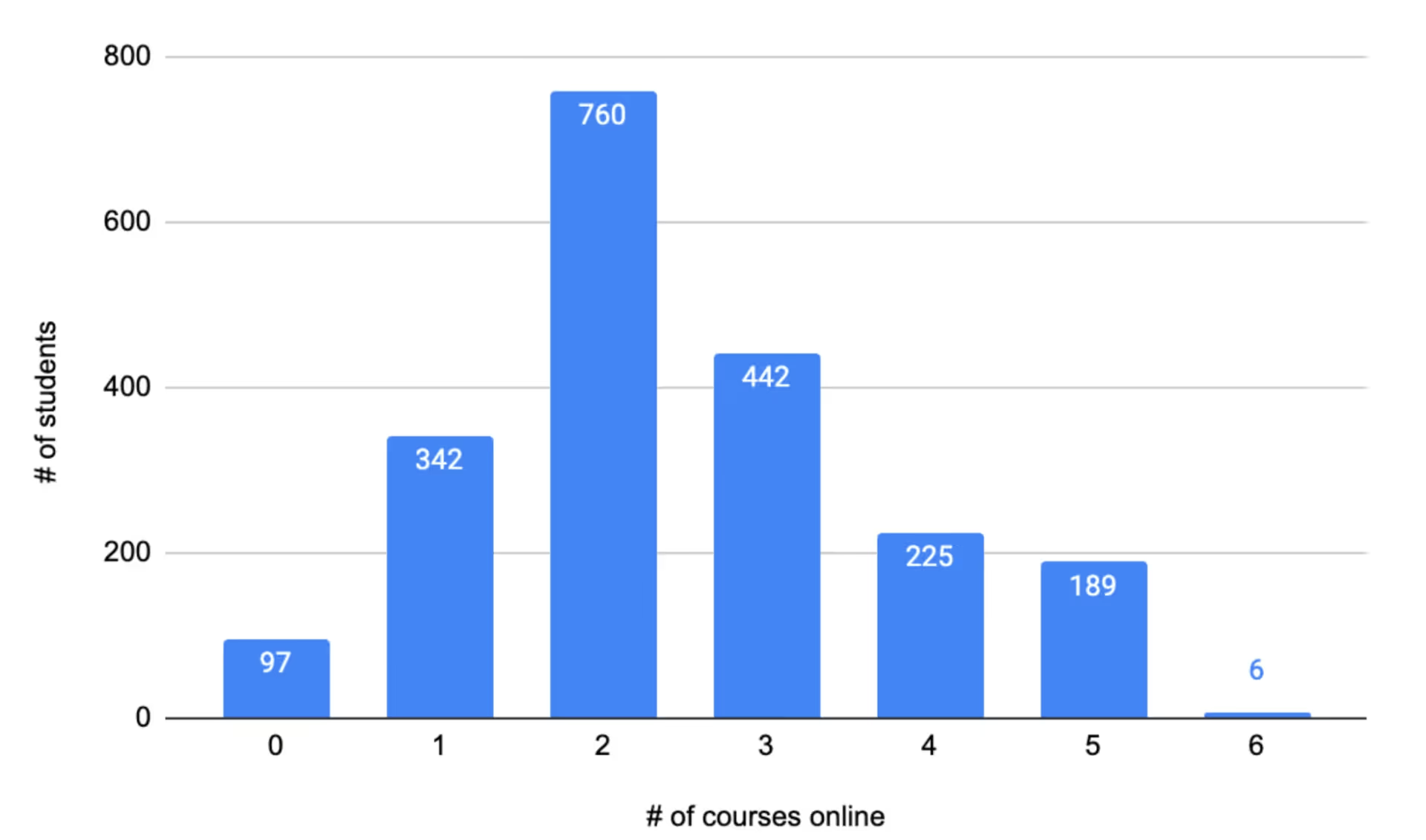The Case for Online Learning: A Data Review
Do residential undergraduate students want online courses? The data speaks for itself.

One of the most significant shifts we've observed in recent years is the growing demand for online learning among residential undergraduate students. The pandemic opened the door to online learning en masse, but the abrupt transition meant the quality of courses widely varied. Educators who didn't have a positive experience with online learning naturally might wonder why this modality has gained traction and how it aligns with institutional missions of delivering high-quality education. Let's explore the latest research on why students are increasingly drawn to online classes and how you can expand your online options for on-campus students.
Undergraduate Student Demand for Online Learning
Last semester we asked students, 'How many online courses would you take in a semester?' A total of 2,061 students responded. Surprisingly (even to us), 86% of the residential undergraduate students surveyed prefer a hybrid learning approach, falling between 1 to 4 online courses per semester ideally. The chart below shows the results indicating 67% of students wanted at least 2 courses online each semester and 95% wanted at least 1 course online. Only 5% prefer entirely on-campus classes, while 9% prefer to have all of their courses online.

While we acknowledge bias in this data as these students are currently enrolled in an online course, independent research confirms this preference with a wider student audience. According to research by McKinsey, 65% of college students want some aspects of their learning to be virtual. In the latest edition of the Changing Landscape of Online Education report, 77% of chief online learning officers agree that campus-based students are asking for online options and 60% of respondents said that online sections of courses typically fill first. Reflecting on the net new enrollment growth opportunity, 92% said online offerings allow them to recruit students within their institutions’ regions, in addition to 87% of respondents indicating online offerings help with reaching student populations outside their traditional recruitment area.
The growing demand for online is clear, but two important questions linger:
- Why do undergraduate students want online courses?
- Why should institutions focused on residential students add online offerings?
The answer to both questions lies in the benefits of online learning for both students and institutions. Those benefits can be clustered into five categories: flexibility and convenience, accessibility and inclusivity, cost-effectiveness, enhanced learning outcomes, and preparedness for the hybrid workplace. Let's dive further into each of these benefits.
1. Flexibility and Convenience
One of the primary reasons students gravitate towards online learning is the flexibility it offers. A 2023 survey by the National Center for Education Statistics (NCES) found that 75% of students enrolled in online courses cited flexibility in balancing work, family, and study commitments as a major advantage. Online classes enable students to access course materials, participate in discussions, and complete assignments at their own pace and on their own schedule. This flexibility is particularly beneficial for student athletes and non-traditional students, such as working professionals and parents, who may struggle to attend on-campus classes regularly.
2. Accessibility and Inclusivity
Online learning also promotes accessibility and inclusivity. According to a 2022 report by the Online Learning Consortium (OLC), 68% of students with disabilities reported that online classes better accommodated their needs compared to traditional in-person courses. Features such as recorded lectures, captioned videos, and digital textbooks ensure that all students, regardless of their physical or learning disabilities, can access and engage with the course content. This inclusive approach not only supports equity but also enriches the learning experience.
3. Cost-Effectiveness
The financial aspect of education cannot be overlooked. Online learning can significantly reduce costs for both students and institutions. A 2021 study by the Education Data Initiative revealed that students save an average of $1,200 per year on commuting and housing expenses by taking online courses. Additionally, institutions can lower operational costs related to physical infrastructure, which can be redirected towards improving educational resources and support services. By offering more online classes, we can make higher education more affordable and accessible to a broader range of students.
4. Enhanced Learning Outcomes
Contrary to some misconceptions, online learning can lead to enhanced learning outcomes. A comprehensive meta-analysis conducted by the U.S. Department of Education in 2020 concluded that students in online courses performed modestly better, on average, than those learning the same material through traditional face-to-face instruction. The study attributes this to the ability of online platforms to offer personalized learning experiences, interactive content, and immediate feedback. Institutions can offer dynamic and engaging educational environments that cater to individual learning styles and needs through online courses.
5. Preparation for the Digital Workplace
In today's growing hybrid and remote job market, proficiency with online tools and platforms is essential. Offering online classes helps students develop crucial digital literacy skills that are highly valued in the modern workforce. According to a 2023 survey by the National Association of Colleges and Employers (NACE), 87% of employers identified digital communication and collaboration as key competencies for new hires. By integrating a small percentage of online courses into curriculum, institutions can help students be more competitive in the job market.
The Value of Consortiums for Online Courses
The demand and rationale for online learning is clear, but prioritizing the in-house development of online courses amidst the multitude of other campus initiatives can be challenging. Another significant advantage of online learning is the opportunity for institutions to collaborate and share courses and programs through a consortium. By participating in a consortium, institutions can offer students a wider variety of courses and specializations that may not be available locally. This not only enriches the academic experience but also allows students to explore new fields of interest.
The Lower Cost Models Consortium (LCMC) is comprised of over 100 small private colleges who share programs across 25 high demand fields to more flexibly and affordably manage a portfolio of programs. The consortium's program sharing is powered by Rize. We build programs from the ground up with career outcomes in mind in partnership with academic and industry experts using our best-in-class course design framework. Paired with proactive, data-driven student success support and comprehensive enrollment services, partner institutions are leveraging Rize to grow enrollment while lowering costs. Our 2024 Impact Report showcases the impact the consortial, hybrid campus model has had on partner institutions and their students. Notably 80% of students rated their courses powered by Rize as good or better than their on-campus courses.
Sharing online courses through a consortium also helps institutions optimize resources. By pooling together expertise and technological infrastructure, institutions can offer high quality online courses that might be too costly for a single institution to produce independently. This collaborative approach not only enhances course and program offerings but also fosters a sense of academic community and shared focus on outcomes among faculty and students.
Conclusion
As we look towards the future, offering online learning opportunities is becoming increasingly essential. The growing demand for online courses is not just a trend but a reflection of the changing needs and preferences of students. By embracing online education for residential students in a hybrid model, institutions can offer greater flexibility, accessibility, cost-effectiveness, and enhanced learning outcomes. Moreover, online offerings can help students develop the digital and industry-specific skills necessary to succeed in their careers. By working together, institutions can leverage the potential of online learning and continue the tradition of providing exceptional education in innovative ways.

The Case for Online Learning: A Data Review
Do residential undergraduate students want online courses? The data speaks for itself.
One of the most significant shifts we've observed in recent years is the growing demand for online learning among residential undergraduate students. The pandemic opened the door to online learning en masse, but the abrupt transition meant the quality of courses widely varied. Educators who didn't have a positive experience with online learning naturally might wonder why this modality has gained traction and how it aligns with institutional missions of delivering high-quality education. Let's explore the latest research on why students are increasingly drawn to online classes and how you can expand your online options for on-campus students.
Undergraduate Student Demand for Online Learning
Last semester we asked students, 'How many online courses would you take in a semester?' A total of 2,061 students responded. Surprisingly (even to us), 86% of the residential undergraduate students surveyed prefer a hybrid learning approach, falling between 1 to 4 online courses per semester ideally. The chart below shows the results indicating 67% of students wanted at least 2 courses online each semester and 95% wanted at least 1 course online. Only 5% prefer entirely on-campus classes, while 9% prefer to have all of their courses online.

While we acknowledge bias in this data as these students are currently enrolled in an online course, independent research confirms this preference with a wider student audience. According to research by McKinsey, 65% of college students want some aspects of their learning to be virtual. In the latest edition of the Changing Landscape of Online Education report, 77% of chief online learning officers agree that campus-based students are asking for online options and 60% of respondents said that online sections of courses typically fill first. Reflecting on the net new enrollment growth opportunity, 92% said online offerings allow them to recruit students within their institutions’ regions, in addition to 87% of respondents indicating online offerings help with reaching student populations outside their traditional recruitment area.
The growing demand for online is clear, but two important questions linger:
- Why do undergraduate students want online courses?
- Why should institutions focused on residential students add online offerings?
The answer to both questions lies in the benefits of online learning for both students and institutions. Those benefits can be clustered into five categories: flexibility and convenience, accessibility and inclusivity, cost-effectiveness, enhanced learning outcomes, and preparedness for the hybrid workplace. Let's dive further into each of these benefits.
1. Flexibility and Convenience
One of the primary reasons students gravitate towards online learning is the flexibility it offers. A 2023 survey by the National Center for Education Statistics (NCES) found that 75% of students enrolled in online courses cited flexibility in balancing work, family, and study commitments as a major advantage. Online classes enable students to access course materials, participate in discussions, and complete assignments at their own pace and on their own schedule. This flexibility is particularly beneficial for student athletes and non-traditional students, such as working professionals and parents, who may struggle to attend on-campus classes regularly.
2. Accessibility and Inclusivity
Online learning also promotes accessibility and inclusivity. According to a 2022 report by the Online Learning Consortium (OLC), 68% of students with disabilities reported that online classes better accommodated their needs compared to traditional in-person courses. Features such as recorded lectures, captioned videos, and digital textbooks ensure that all students, regardless of their physical or learning disabilities, can access and engage with the course content. This inclusive approach not only supports equity but also enriches the learning experience.
3. Cost-Effectiveness
The financial aspect of education cannot be overlooked. Online learning can significantly reduce costs for both students and institutions. A 2021 study by the Education Data Initiative revealed that students save an average of $1,200 per year on commuting and housing expenses by taking online courses. Additionally, institutions can lower operational costs related to physical infrastructure, which can be redirected towards improving educational resources and support services. By offering more online classes, we can make higher education more affordable and accessible to a broader range of students.
4. Enhanced Learning Outcomes
Contrary to some misconceptions, online learning can lead to enhanced learning outcomes. A comprehensive meta-analysis conducted by the U.S. Department of Education in 2020 concluded that students in online courses performed modestly better, on average, than those learning the same material through traditional face-to-face instruction. The study attributes this to the ability of online platforms to offer personalized learning experiences, interactive content, and immediate feedback. Institutions can offer dynamic and engaging educational environments that cater to individual learning styles and needs through online courses.
5. Preparation for the Digital Workplace
In today's growing hybrid and remote job market, proficiency with online tools and platforms is essential. Offering online classes helps students develop crucial digital literacy skills that are highly valued in the modern workforce. According to a 2023 survey by the National Association of Colleges and Employers (NACE), 87% of employers identified digital communication and collaboration as key competencies for new hires. By integrating a small percentage of online courses into curriculum, institutions can help students be more competitive in the job market.
The Value of Consortiums for Online Courses
The demand and rationale for online learning is clear, but prioritizing the in-house development of online courses amidst the multitude of other campus initiatives can be challenging. Another significant advantage of online learning is the opportunity for institutions to collaborate and share courses and programs through a consortium. By participating in a consortium, institutions can offer students a wider variety of courses and specializations that may not be available locally. This not only enriches the academic experience but also allows students to explore new fields of interest.
The Lower Cost Models Consortium (LCMC) is comprised of over 100 small private colleges who share programs across 25 high demand fields to more flexibly and affordably manage a portfolio of programs. The consortium's program sharing is powered by Rize. We build programs from the ground up with career outcomes in mind in partnership with academic and industry experts using our best-in-class course design framework. Paired with proactive, data-driven student success support and comprehensive enrollment services, partner institutions are leveraging Rize to grow enrollment while lowering costs. Our 2024 Impact Report showcases the impact the consortial, hybrid campus model has had on partner institutions and their students. Notably 80% of students rated their courses powered by Rize as good or better than their on-campus courses.
Sharing online courses through a consortium also helps institutions optimize resources. By pooling together expertise and technological infrastructure, institutions can offer high quality online courses that might be too costly for a single institution to produce independently. This collaborative approach not only enhances course and program offerings but also fosters a sense of academic community and shared focus on outcomes among faculty and students.
Conclusion
As we look towards the future, offering online learning opportunities is becoming increasingly essential. The growing demand for online courses is not just a trend but a reflection of the changing needs and preferences of students. By embracing online education for residential students in a hybrid model, institutions can offer greater flexibility, accessibility, cost-effectiveness, and enhanced learning outcomes. Moreover, online offerings can help students develop the digital and industry-specific skills necessary to succeed in their careers. By working together, institutions can leverage the potential of online learning and continue the tradition of providing exceptional education in innovative ways.

